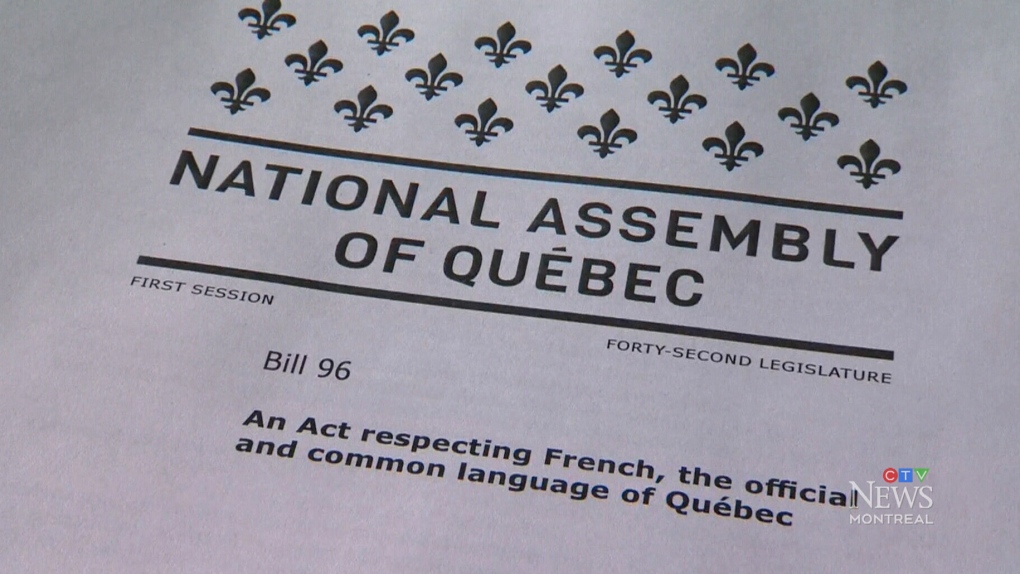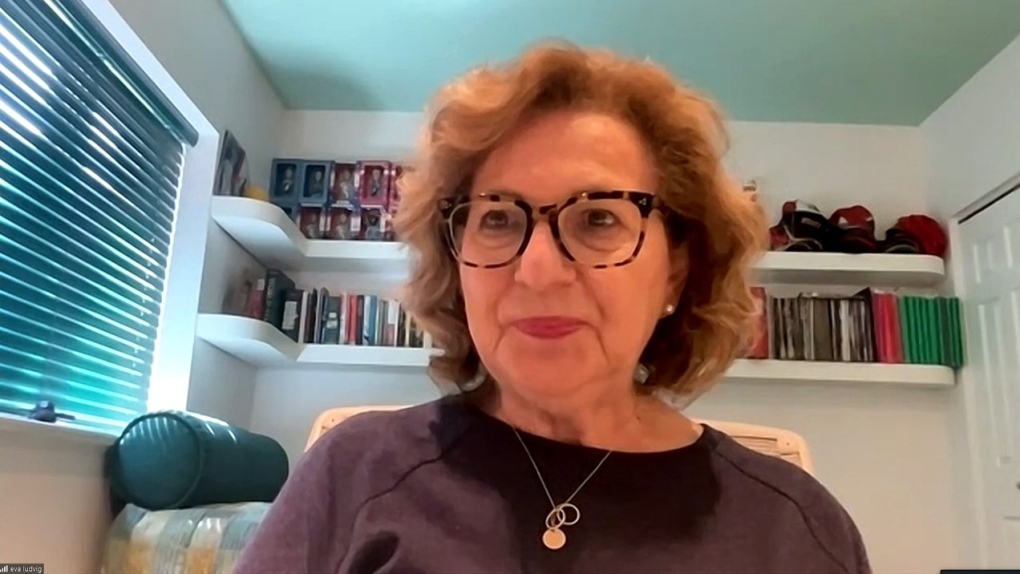5 changes in Quebec's Bill 96 that come into effect June 1
On June 1, 2022, Quebec’s Bill 96 became law, which brought sweeping changes to the Charter of the French language.
The controversial law, which limits the use of English in certain settings, was designed to protect the use of French in Quebec, but since it was passed it has prompted protests, court challenges, and concern from groups representing English-speaking Quebecers.
Parts of the new law will come into effect on June 1, the one-year anniversary of the bill receiving royal assent.
Here is a quick summary of some of the changes that are coming.
SERVICES FOR NEW IMMIGRANTS
New immigrants to Quebec will be given a grace period before provisions of Bill 96 — whose official name is An Act respecting French, the official and common language of Quebec — directly affect them. Beginning June 1, new immigrants must receive government services exclusively in French six months after their arrival in Quebec.
The government also warns people who are thinking of moving to Quebec permanently that their "knowledge of French will be taken into account in the selection process" and their French-language proficiency will be required for some immigration programs for those wishing to transition from temporary to permanent status.
One immigration lawyer told CTV News that new arrivals may not even have the chance to learn French in their first six months.
"There is a high likelihood that in the first six months, or close to six months, they aren't even able to get into French classes. So, this looks like a symbolic thing," said David Chalk.
"It looks like something that is more aimed at the electorate than it is at some sort of meaningful change in immigration policy."
COMPANIES TO DECLARE WORKERS' FRENCH SKILLS
Another big change: companies that have between five and 49 employees will have to start declaring the proportion of their workforce that is "unable to communicate in French." The proportion of a company's French-language proficiency will be made public in the business register.

The new rule applies not only to new companies, who must disclose this information in their declaration of registration, but also to existing companies when they do their annual update declaration, according to a notice published on April 27 on the Registraire des enterprises website.
The government defines being able to communicate in French as having the ability to perform tasks in French.
"Depending on an employee's job category and the tasks assigned to him, this ability can be assessed in the context of verbal or written exchanges with colleagues, superiors or customers," according to the government.
"Communicating in French implies, for example, having the ability to understand work instructions, to attend meetings, to take training, to write or share work documents (memos, reports, forms, etc.) and serve customers in French."
Jean-François Roberge, the minister responsible for the French language, said Quebec's language watchdog, the Office québécois de la langue française (OQLF), will help enterprises with this requirement.
 Eva Ludwig is the president of the Quebec Community Groups Network, which represents anglophones in Quebec. (CTV News)
Eva Ludwig is the president of the Quebec Community Groups Network, which represents anglophones in Quebec. (CTV News)
But the Quebec Community Groups Network (QCGN), an organization that advocates on behalf of English speakers, is concerned about the effect this might have on small businesses.
"What does adequate mean? Who evaluates it? This needs to be done on an annual basis. This is at a time when there is a labour shortage and it's already difficult to find employees," said Eva Ludwig, the QCGN's president, in an interview.
The Canadian Federation of Independent Business has also said it worries Bill 96 will create more of a burden on small businesses that are already struggling.
NEW PORTAL FOR LEARNING FRENCH
As of Thursday, anyone wishing to improve their French-language skills will be able to register with the government's new online portal. The Francization Québec portal will be available to new arrivals, future immigrants who want to learn French before their arrival in Quebec, workers and Quebec residents who don't speak French.
Quebec's minister of immigration, francization and integration, Christine Fréchette, announced the new portal Monday ahead of the June 1 deadline set by Bill 96.
"In 2017, the Auditor General had said that the organization of francization services was a real fiasco," Frechette said after announcing the initiative.
CERTAIN CONTRACTS MUST BE IN FRENCH FIRST
Bill 96 also changes how certain contracts are handled in Quebec. Starting on June 1, adhesion contracts (contracts that are drafted by a single party and are non-negotiable) can only be signed in a language other than French when a French version was also first presented. An example of adhesion contracts include insurance policies, terms of service, and franchise agreements.
Previously, it was standard practice to present a contract in English as long as there was a clause stating that the parties requested an English-only document, as noted by the business law firm McMillan, which operates in Montreal.
LANGUAGE OF CIVIL ADMINISTRATION
With the goal of promoting French, Bill 96 will require the civil administration to use French "in an exemplary manner," according to section 13.2 of act. This applies to government ministries and agencies, municipal organizations, health and social services organizations, and educational organizations, with some exceptions.
Exceptions include people eligible to receive education in English, Indigenous peoples, immigrants who have been in Quebec for less than six months, tourist services, and when the government is providing services outside of Quebec.
- Listen on CJAD 800: Mennie: How long before francophone businesses push back on Bill 96?
With files from CTV News Montreal's Amanda Kline
CTVNews.ca Top Stories

BREAKING Honda to get up to $5B in govt help for EV battery, assembly plants
Honda is set to build an electric vehicle battery plant next to its Alliston, Ont., assembly plant, which it is retooling to produce fully electric vehicles, all part of a $15-billion project that is expected to include up to $5 billion in public money.
BREAKING New York appeals court overturns Harvey Weinstein's 2020 rape conviction from landmark #MeToo trial
New York’s highest court on Thursday overturned Harvey Weinstein’s 2020 rape conviction, finding the judge at the landmark #MeToo trial prejudiced the ex-movie mogul with improper rulings, including a decision to let women testify about allegations that weren’t part of the case.
Residents of northern Alberta First Nation told to shelter in place
Residents of John D'Or Prairie, a community on the Little Red River Cree Nation in northern Alberta, were told to take shelter Thursday morning during a police operation.
Secret $70M Lotto Max winners break their silence
During a special winner celebration near their hometown, Doug and Enid shared the story of how they discovered they were holding a Lotto Max ticket worth $70 million and how they kept this huge secret for so long.
Remains from a mother-daughter cold case were found nearly 24 years later, after a deathbed confession from the suspect
A West Virginia father is getting some sense of closure after authorities found the remains of his young daughter and her mother following a deathbed confession from the man believed to have fatally shot them nearly two decades ago.
Monthly earnings rise, payroll employment falls: jobs report
The number of vacant jobs in Canada increased in February, while monthly payroll employment decreased in food services, manufacturing, and retail trade, among other sectors.
First in Canada procedure performed at London, Ont. hospital
A London man has become the first person in Canada to receive a robotic assisted surgery on his spine. Dave Myeh suffered from debilitating, chronic back pain that led to sciatica in his right now and extreme pain in his lower back.
Doctors say capital gains tax changes will jeopardize their retirement. Is that true?
The Canadian Medical Association asserts the Liberals' proposed changes to capital gains taxation will put doctors' retirement savings in jeopardy, but some financial experts insist incorporated professionals are not as doomed as they say they are.
Something in the water? Canadian family latest to spot elusive 'Loch Ness Monster'
For centuries, people have wondered what, if anything, might be lurking beneath the surface of Loch Ness in Scotland. When Canadian couple Parry Malm and Shannon Wiseman visited the Scottish highlands earlier this month with their two children, they didn’t expect to become part of the mystery.































